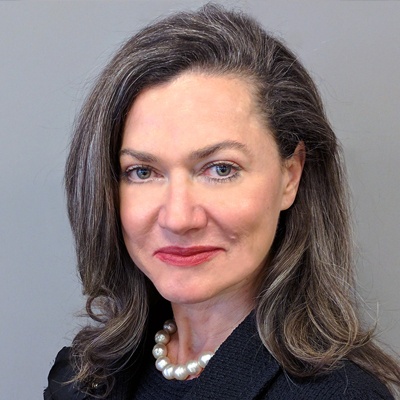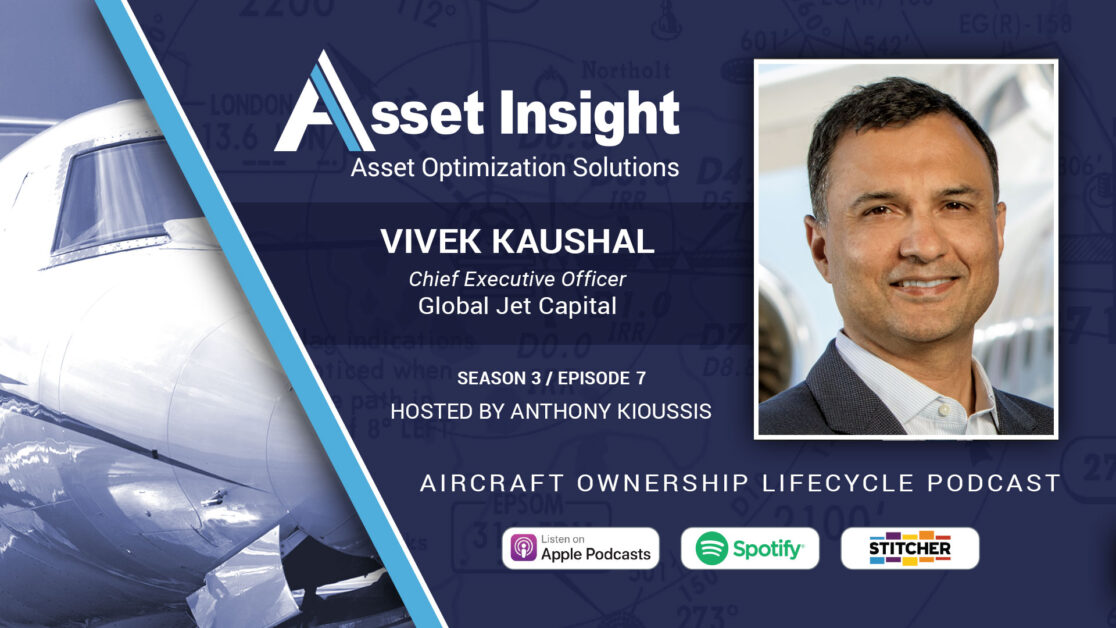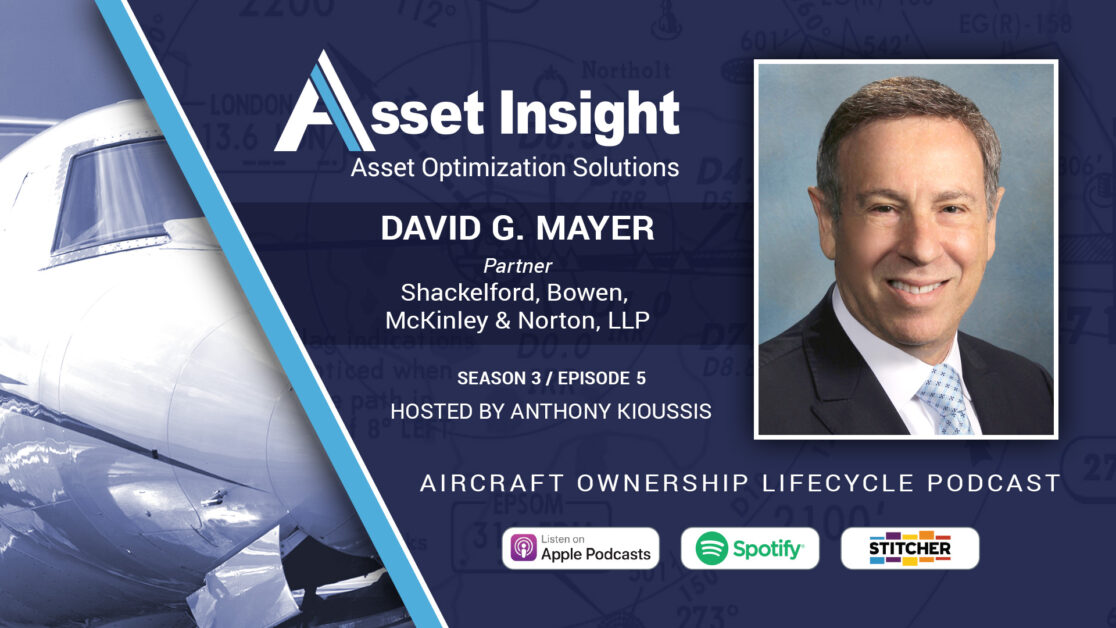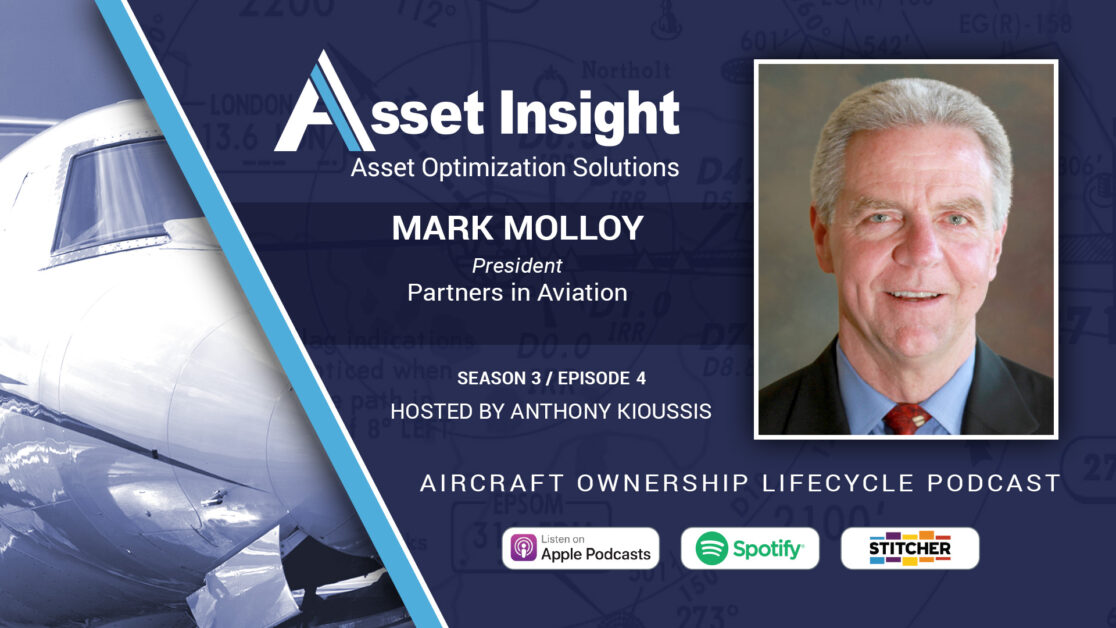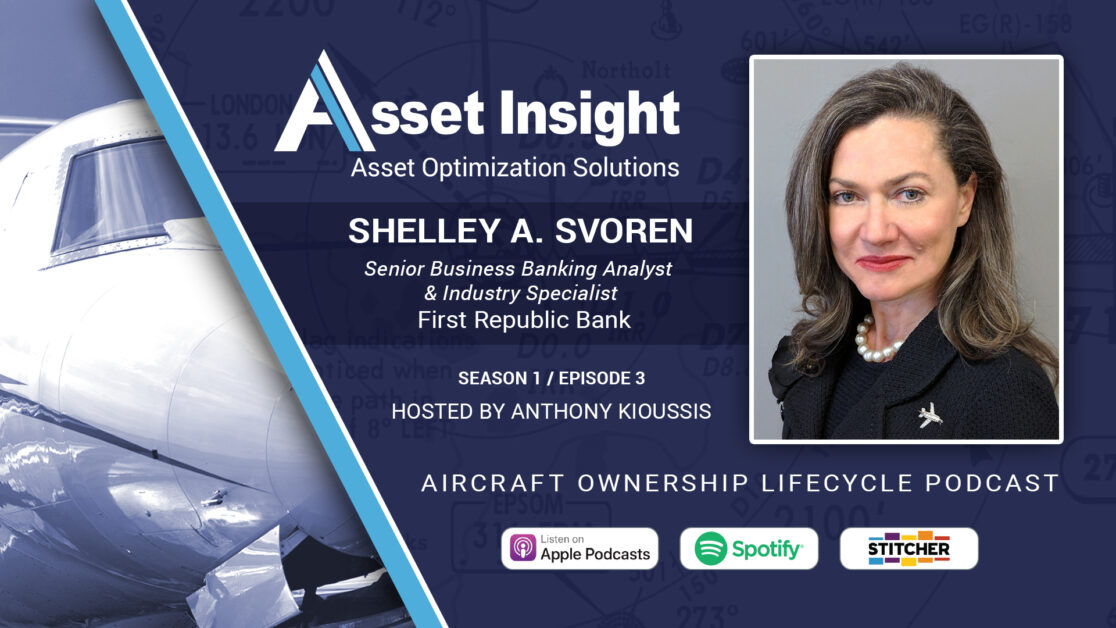
SEASON 1 • EPISODE 3
Bank Portfolio Management and the Client Relationship
A discussion with Shelley Svoren about Portfolio Management, and overseeing the sizable portfolio of financed aircraft at First Republic Bank – a well-respected company within the Business Aircraft finance community. Areas covered include:
- Defining Portfolio Management as it relates to Private Aircraft assets financed by First Republic.
- Portfolio Management requirements to expect in the market today, especially as they relate to the impact of COVID-19?
- Small business owners, many of whom are owner/pilots, and what is unique to Portfolio Management when it comes to aircraft financed by these individuals.
- What are some of the changes to Portfolio Management as collateral size increases from a turboprop and to a jet?
- Considerations people should keep in mind with respect to what a Portfolio Manager may require when the deal is initiated, or as the completed transaction progresses through its life.
- What people should know about First Republic Bank’s services within the Business and General Aviation community.
Shelley also discusses the International Aviation Women’s Association (IAWA), including:
- The group’s global aviation & aerospace network representing women of achievement across the aviation industry.
- IAWA’s educational efforts and next generation development within the aviation industry.
About Shelley A. Svoren
Her 28 year career in financial analysis and credit quality includes roles as Assistant Bank Examiner for the FDIC, Assistant Vice President at Silicon Valley Bank, and Financial Analyst for Agilent Technologies and Southcorp Wines, where she created and managed a $500MM+USD budget for its North American operations and oversaw the financial operations for a joint venture.
She oversees the underwriting and portfolio management for FRB’s Aviation & Marine team, which has yet to incur a loss or foreclosure. She works with FRB’s clients located throughout the US who are involved in diverse businesses – real estate, private equity, venture capital, and entrepreneurs as FRB specializes in meeting their unique financing needs– and aircraft are used as business tools to expand their clients’ brands. She moderates panels and speaks at conferences regarding aviation and marine industries; writes articles; and mentors junior colleagues.
She serves on the boards of the Society of Daughters of Holland Dames and the International Aviation Womens Association, where she oversees the Scholarship, Mentorship, Internship, and Leadership Development committees; and is involved in over 20 organizations that are dedicated to historic preservation and meeting the needs of her community. She earned her BS from the University of Oregon with a focus on Finance, Economics, and Scandinavian Studies.
First Republic Bank
First Republic Bank’s Aviation loan portfolio is geographically diverse with its clients centered in the Bank’s key geographic markets. Furthermore, our clients are involved in diverse business activities for which FRB specializes in meeting the unique financing needs of these industries – such as real estate, private equity, hedge funds, venture capital, and the wine industry– and they use aircraft as a tool to conduct business. Since inception in 2006, the team has funded over 150 aircraft transactions with original commitments exceeding $950MM since the team commenced operations. Our foreclosures and losses have totaled $0.00 during this time.
Founded in 1985, First Republic Bank (NYSE: FRC) and its subsidiaries offer private banking, business banking, and private wealth management services. These services include a complete line of banking products for individuals and businesses are offered through our San Francisco, Palo Alto, Los Angeles, Santa Barbara, Newport Beach, San Diego, Portland, Jackson Wyoming, Boston, Palm Beach, Greenwich, and New York City area preferred banking offices. Publicly traded under the NYSE stock symbol “FRC,” First Republic is a constituent of the S&P 500 Index and KBW Nasdaq Bank Index. The Bank exceeds all of the current regulatory guidelines to be well-capitalized and is a member of the Federal Deposit Insurance Corp. (FDIC) and an Equal Housing Lender.
The Bank, with over $115 Billion in Assets, was rated in the top 50 Banks in 2019
Welcome to another Asset Insight Podcast covering the Aircraft Ownership Lifecycle. I am Tony Kioussis, president of Asset Insight and your host. We will be discussing portfolio management today. Joining me is Shelley Svoren, senior business banking analyst and industry specialist with respect to aircraft financing at First Republic Bank, which is a well-known and well-respected company within the business aviation finance community. Welcome to our educational podcast series covering the Aircraft Ownership Lifecycle, Shelley.
Shelley Svoren (01:06):
Thank you so much for having me today on your podcast, Tony. I really appreciate this opportunity.
Tony Kioussis (01:11):
Thank you for taking the time to come on the show, Shelley. Let’s start off by defining portfolio management as it relates to private aircraft assets residing in a bank’s portfolio.
Shelley Svoren (01:25):
To me, when I think in terms of portfolio management, I think about the ongoing credit quality of our assets and how those loans are performing on our books. With First Republic Bank, we only offer traditional debt financing, we do not offer leases. So for us, we are truly a relationship bank, and we work with our clients with whom we’ve developed a relationship to finance their aircraft needs. In discussing that relationship, we not only look to how we value the aircraft and how we’ve structured the loan, and how that’s being repaid over time, we also look at how our clients are performing from a financial perspective and what is changing in their universe. Because every time we touch our transactions, it’s an opportunity for us to learn more about our clients and find opportunities for us to help them with their business needs. So for us, portfolio management is a little bit more than just truly thinking about the asset, it’s thinking about the relationship and where it’s going.
Tony Kioussis (02:40):
I know that you folks oftentimes invest quite a bit of time in helping the client make a decision as to the right aircraft for their needs. Is that something you view in the portfolio management arena or is that something another group in the bank would do?
Shelley Svoren (02:57):
Well, that’s definitely something that we discuss with our clients upfront and on an ongoing basis. We don’t pick the aircraft for them, but we do provide them with the statistics and the insight that our client base is also sharing with us, as well as what our partners out in the industry see. So, we do not advise individuals on what to buy or how to buy it, but we certainly partner with people such as yourself and the aircraft advisers, the brokerage community, also, attorneys, tax advisors, management companies, so that our clients are receiving the best advice that they can possibly find that helps their business succeed. Some of the things that we will do … When we’re having conversations with clients we really ask them, “How do you think you are going to use that aircraft? What are the stage lengths that they’ll have? What are the trips that they’re going to take?”
Shelley Svoren (04:01):
If a client wants to buy a Global 5000 to fly from LA to Aspen, that’s when we start scratching our head and have them start speaking to an aircraft advisor or a broker who can really get them together and see whether or not that aircraft purchase makes sense. Does the aircraft meet the mission that they have? When we’re having our conversations, we definitely want to gently guide them to a conclusion that’s going to be financially in their best interest. But again, we are not formal advisors. We are not aircraft brokers. But it is something that we do like to discuss with our clients because we are passionate about the collateral, and how it’s maintained and how it’s used.
Tony Kioussis (04:47):
Yeah. The enthusiasm of acquiring an aircraft at times gets ahead of the prospective owners capabilities and actual use of the assets, so I think that’s a great way to approach it from your perspective, and a great service to your clients as well. What would be the portfolio management requirements I should expect in the market today, especially as they relate to the impact of the COVID-19 crisis?
Shelley Svoren (05:12):
When we underwrite a transaction initially, we complete a lot of due diligence. When clients are transparent in answering those questions, it really helps us structure a deal with them that makes sense. In this day and age, with COVID-19, one has to go back to their very basics of credit underwriting, “What do we know about our clients? What are the challenges that they are facing?” That means you need to do something very important. And it’s so simple, pick up the phone and call your client, and ask the question, “How are you doing? What are the challenges you’re facing? What do you see occurring over the next three months, six months, 12 months?” Those are some of the things that you should have, because ultimately, we don’t want to take an aircraft back. In fact, we haven’t taken an aircraft back since Jim Simpson started this team in 2006. We want to make sure that we are listening to our clients and what their needs are.
Shelley Svoren (06:21):
What’s been interesting, we’ve had a mixed discussion with our clients as far as how the pandemic is impacting their businesses. In some instances, with a lower interest rate environment, some of our clients have seen real successes because of their business. In other instances, we’ve seen some challenges. If a client is heavily involved in real estate filled with non-essential businesses, that’s when we have the conversation about, “What can we do to help you through this difficult time?” Those are some of the more broader questions we’re asking our clients.
Shelley Svoren (06:59):
As it relates to collateral values, we are looking at that. We do touch those on an ongoing basis. And we are looking to what the market is doing at this point in time. What’s interesting for us to see it. I think if you’ve listened to any other organizations that have podcasts, crowdcasts, you name it, they’re seeing an uptick in the phone ringing and having first-time buyers consider purchasing an aircraft. We are seeing that as well. So it truly is an opportunity for business aviation to expand the number of users.
Shelley Svoren (07:39):
Let’s face it, who didn’t see that United video where the cabin was packed, flying from San Francisco to Newark. I think seeing that caused a lot of pause, and people are thinking, “If I normally fly an aircraft and I upgrade to first class, maybe I should book a charter.” And for people who normally charter, some are thinking, “Maybe I want to look at a fractional share.” And for people in fractional shares, maybe they’re thinking about purchasing an aircraft. And for those who own an aircraft and have chartered it, some might be thinking, “Do I really need to charter it to third parties?” Those are some of the questions that are occurring right now. I can’t tell you as a global level whether or not values are stabilizing, values are decreasing. But I think having the interest that we’re seeing in the industry will probably lead to some stabilization in value.
Tony Kioussis (08:42):
Let’s talk about small business owners, many of whom are owner pilots. Is there anything unique to portfolio management when it comes to aircraft finance by and for these individuals?
Shelley Svoren (08:56):
Well, we tend to work with a lot of aircraft owners who are not owner pilots. They tend to have their aircraft managed by an aircraft management company. One of the things we have seen, though, is the increase in insurance premiums and obtaining liability coverage. That’s become much more difficult, and it’s become much more expensive to obtain the necessary insurance that’s required by banks.
Tony Kioussis (09:28):
Let’s talk about what are some of the changes with respect to portfolio management as collateral size increases. Say a client is going from a turboprop to a jet, are there any changes in the way you view it?
Shelley Svoren (09:42):
I always start with the basics, “Can the individual pay for the aircraft? And if they can’t, should they be owning this aircraft?” Those are some of the metrics that I actually look for when a client is looking to move from a turboprop to a jet, can they afford it? And if so, and we want to move forward, “Do they understand that the maintenance requirements are going to be very different? Do they understand what the operating costs are going to be?” Maintenance obviously plays a role in the operating expenses. So, those are some of the issues that we look at. We also really focus on maintenance of the aircraft, as far as, “Are they enrolled in engine programs?” Because as you go from a turboprop engine and propellers, the aircraft engines become even more complex to maintain and obtain on those regular cycles. So those questions that we have and they become a part of our aircraft collateral.
Tony Kioussis (10:43):
Are there other unique considerations people should keep in mind with respect to what a portfolio manager might require when the deal is initiated or as the complete-a-transaction progresses through its life?
Shelley Svoren (10:57):
I think that’s a great question, Tony. Thank you for asking it. When you work with a financier versus a broker, you are building a relationship that will have touch points over time. Most financial institutions are highly regulated, so there is a requirement by the overseeing team. It can be called many different things within an organization. But you do want to make sure that the credit risk is always adequately addressed. Whether or not that risk be the underlying collateral, the industry that the client works in, or a particular issue that is unique to that individual who owns the aircraft, you want to address those over time. So I think it’s very important for borrowers, owners of the aircraft, to be as transparent as possible with their lender. And lenders should do the same thing, likewise. I think it’s very important to say up front, if you’re structuring a transaction that requires financial reporting requirements, you need to explain why you’re requesting those items. What does it mean? And if you’re establishing financial covenants, you really do need to explain what that means and how that will be calculated upfront so that there’s no misunderstandings.
Shelley Svoren (12:22):
Some banks don’t have financial and reporting covenants. Some do not have recourse, or do maintain limited recourse. It’s always best upfront. I know the lending community is probably shaking their heads in agreement, you really do need to communicate that upfront and on an ongoing basis. Some provide different levels of service. Such as in First Republic Bank’s case, we annually review the value of the aircraft with a third party aircraft appraiser, and we provide a copy of that valuation to our clients so that they understand this is what the bank is seeing. And if there are any questions, we address it at that time.
Tony Kioussis (13:05):
First Republic Bank has become a well-respected entity within the aircraft finance community. Is there anything specific you want people to know about First Republic?
Shelley Svoren (13:15):
What people should know about First Republic Bank is that we’re a bank that focuses in on people. We have a tremendous set of core values that I hope that people would be interested in viewing on our website. That speaks to who we are and what we value. And we have great competitors out in the market who do a tremendous job of servicing the needs of the aviation industry. They’re all fantastic. We want everyone to find the right home and the right partner for their aircraft needs.
Tony Kioussis (13:51):
Well, thanks so much, Shelley. I appreciate the in-depth review of portfolio management and your comments on the industry in general. I would like to talk a little bit about your involvement in the industry. I know you’re heavily involved in IAWA. Could you go into your involvement within IAWA and it’s focus on industry education and industry personnel?
Shelley Svoren (14:14):
IAWA, as you mentioned, is the International Aviation Women’s Association. It is different from other organizations within the aviation industry in that our members are in either a management or a leadership role in the aviation industry, having been there for at least five years before they can apply for membership. You do not have to have a technical background in order to be a member of IAWA. Meaning you don’t need to be a director of maintenance, you don’t necessarily need to be a pilot, but you just need to be in a leadership role. Five years seems like a lengthy time to have been in the industry, but it does show a commitment to being in the industry.
Shelley Svoren (14:58):
I’ve served on the board of IAWA now, I’m coming up on my third year. Previously, I served as the VP of General Business Aviation & Helicopters. What I do today, I still serve on the board, but I moved into the role that’s focused on next generation development of leaders in the aviation industry. And underneath me are four amazing committees. The Scholarship Committee, the Mentoring Committee, the Internship Committee, and the Leadership Development Committee. We provide scholarships with eight universities located throughout the world that are focused on aviation and aerospace. And we’re looking to add two more, one in France and one in South America. So we truly are a global organization.
Tony Kioussis (15:53):
This has been another Asset Insight Podcast covering the Aircraft Ownership Lifecycle. Please visit our ever-growing podcast library at assetinsightpodcast.com and select from any number of topics discussed with business aviation industry experts. This is Tony Kioussis. As always, thank you for listening.
Don’t forget to share this podcast!
